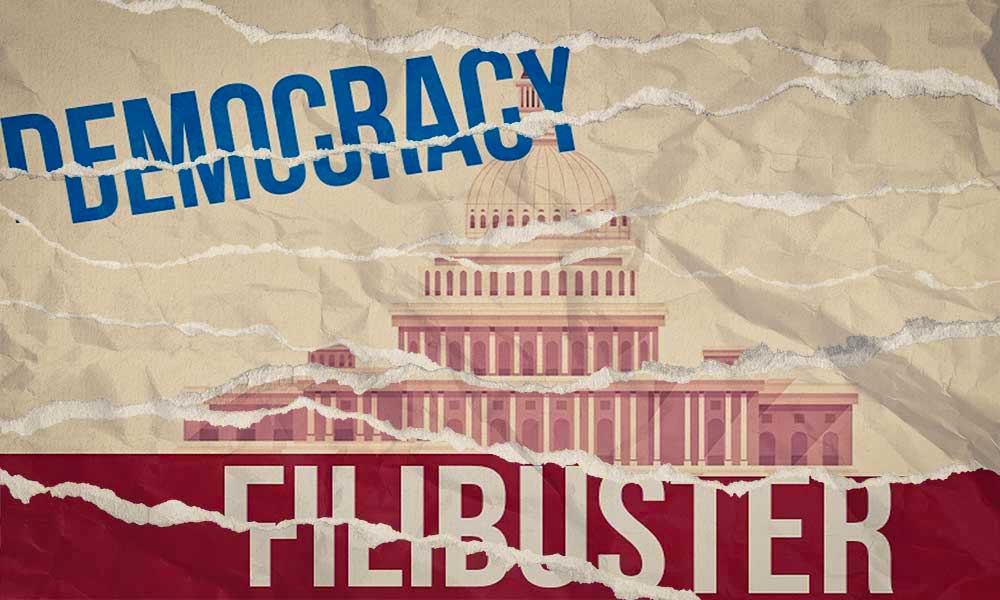
DEBATERS
Richard Arenberg is a visiting professor of political science at Brown University. His books include Congressional Procedure: A Practical Guide to the Legislative Process in the U.S. Congress and Defending the Filibuster: Soul of the Senate, coauthored with former Senate parliamentarian Robert Dove.
Sarah A. Binder is a professor of political science at The George Washington University, senior fellow in governance studies at the Brookings Institution and the author or coauthor of several books about Congress, including Politics or Principle?: Filibustering in the U.S. Senate.
INTERVIEW WITH RICHARD ARENBERG
Is the Filibuster Good for Democracy? | Yes
Is the filibuster good for democracy?
Yes. Democracy entails more than merely majority rule. It implies concern about minority rights. There’s an old expression that democracy is something more than two wolves and a sheep voting on what to have for dinner. I subtitled my book defending the filibuster Soul of the Senate, because it’s that fundamental.
In the House of Representatives, as long as the Speaker can hold her majority together, she can do pretty much what she wants, and that’s fine. The Senate is very different; the minority can almost always influence legislative outcomes. That difference has played a very important role in fostering bipartisanship, negotiation and moderation.
We don’t resolve crises in our country very quickly, but when we do, the Senate is usually the cradle of the compromise. That’s because merely to operate the Senate from day to day requires majority-minority cooperation. As toxic as things are right now, even though Majority Leader Chuck Schumer doesn’t talk to Minority Leader Mitch McConnell much, their staffs are in constant communication; they have to be.
To me, the 60-vote threshold is critical to the foundation of the Senate—part of its DNA. Every senator understands that to get legislation through, they’ll need some degree of buy-in from the minority. I worked on Capitol Hill for 34 years, for three different Democratic senators, and whenever I brought any of them anything, the first question was “Who’s my Republican co-sponsor?” We’d often negotiate with several Republicans before the bill was even proposed.
The filibuster is not a partisan issue. People get that superficial impression because right now many Democrats want to eliminate it and Republicans are largely defending it. But if in the next election the Republicans take control of the Senate, I’m fairly certain that the Democrats currently calling for the elimination of the filibuster won’t continue to do so.
Is the history of the filibuster important?
I would never say history isn’t important. But I don’t think evil or immoral use of a rule, like the filibuster during the civil rights movement, means that the rule itself is bad. The filibuster is often blamed for the partisan gridlock in the Senate, but the underlying disease is hyper-partisan polarization, not only in the Senate but across our political terrain. I call it the weaponization of procedure: When you carry rules to their logical extreme and abuse them, then you don’t have good democratic debate or good outcomes. But that’s largely a question of members’ behavior.
Changing the rules rarely solves the problem. Abolishing the filibuster will only exacerbate polarization.
Every senator understands that to get legislation through, they’ll need some degree of buy-in from the minority.
Is it true that the filibuster was created by accident? It’s often framed that way, but if so, that was in 1806. If it was a mistake, it’s ceased being one because the Senate has protected, supported and kept it for more than 200 years. That doesn’t sound very accidental to me.
Can reforms to the filibuster make democracy work better?
There are some reforms that might reduce the filibuster’s frequency. Right now, any bill can be filibustered at two points: the majority leader’s motion to proceed—to bring the bill to the floor—and then during consideration of the bill itself. That’s two bites at the apple. It used to be very unusual to filibuster the motion to proceed, but now the minority often does this. The majority leader should have the power to bring a bill to the floor so it’s open to amendment and debate and the public can put pressure on the minority. That’s how it’s supposed to work. We got there eventually on civil rights. I also support more use of what’s called the “talking filibuster”—the one people remember Jimmy Stewart using in Mr. Smith Goes to Washington.
Do you think any reforms will happen?
It’s not likely. Some want a “cutout”—to ban filibusters for one type of legislation, such as voting rights, or lifting the debt ceiling. But mostly those who want to do this want to pass things in the Biden agenda that don’t have any bipartisan support. I don’t mean to be pejorative—I personally support all the bills the progressives are trying to get through. But if you eliminate the filibuster to pass, say, a voting rights bill, what happens in three years if we have a Republican president, House and Senate? They might have all kinds of ideas to restrict the vote. Democrats also have frequently used the filibuster to block things a Republican Senate wanted to do, such as defunding Planned Parenthood and restricting abortion.
Does the filibuster provide any protection for minority groups, such as Jews? It makes it harder for a majority to seize control and move toward more authoritarian government. You can see how that works out by looking at Jewish history. John Adams said, “Mankind will in time discover that unbridled majorities are as tyrannical and cruel as unlimited despots.”
INTERVIEW WITH SARAH A. BINDER
Is the Filibuster Good for Democracy? | No
Is the filibuster good for democracy?
No. The core problem is that, by requiring the Senate to reach 60 votes to end debate on a bill, it prevents the majority from proceeding to a vote. Whether the majority has the votes or not to pass a measure, we never get to a substantive vote, because a minority can block both the motion to bring it to the floor for debate—which also requires 60 votes to pass—and the motion to end that debate. It can prolong debate indefinitely, either by talking on and on or, more often in recent years, merely by threatening to do so. The crux of accountability in a democratic system is knowing where our legislators stand on substantive issues. Without votes, we often don’t, even on the most salient issues of the day.
I coauthored a book about the filibuster 25 years ago, when there was a Republican Senate and a Democratic president, long before the Mitch McConnells of the world—or, if you’re a Republican, you’d say the Harry Reids—had weaponized the filibuster to obstruct the majority party’s agenda. Even then, it was clear to us that the filibuster should go.
Most democratic bodies have majority rule; requirements for a supermajority are few and far between. There are isolated cases in state legislatures: California used to have a two-thirds rule for adopting a budget. The Constitution sets forth different thresholds for different issues—for instance, treaties require two-thirds. But the filibuster doesn’t have any such noble origins. The Framers didn’t call for it or write it into the rules. They had all lived under supermajority rule under the Articles of Confederation, which often led to deadlock, and they didn’t like it.
Does the filibuster’s history matter?
Historically, the filibuster has often been used for immoral ends, including almost a century of efforts to block civil rights laws. The history that defenders cite on the other side is mostly myth. In the mid-20th century, opponents of filibuster reform said, “Look, it doesn’t do any harm; eventually a majority will get what it wants if there’s support out there.” They argue that the filibuster has never really killed anything for which there was broad public support. But there’s ample evidence that that’s not true. There was majority support for civil rights for decades, but no action; Southern senators used the filibuster to block anti-lynching bills, open-housing bills, all sorts of things. It’s hard to say that blocking an anti-lynching bill didn’t harm anyone. How many people lost their lives because of the lack of that and other civil rights laws? More recently, if you consider the environment a moral issue, we’ve seen many instances of environmental legislation filibustered over the years.
Is it true that the filibuster was created by accident?
That’s my reading of early Senate history. The Senate had a form of the rule the House uses today to cut off debate, the so-called “previous question” rule, but it hadn’t used it for that purpose. When Aaron Burr stepped down as vice president, he suggested senators clean up the rule book, and it disappeared. These were very small chambers, 26 senators, and they were experimenting, using a rule one way and then the other. Out of that murky soup came a procedural change that has had lasting consequences.
Can reforms to the filibuster make democracy work better?
I’d be in favor of either abolishing it or of making incremental reforms—since there are always unanticipated consequences—to address the more egregious cases, when it’s being used not to build larger coalitions (as supposedly intended) but to block action altogether. I’d certainly favor lowering the threshold from 60 votes, which is arbitrary to begin with.
The crux of accountability in a democracy is knowing where our legislators stand. Without votes, we often don’t.
Minority parties often argue they need a chance to be heard, to make their case or rally the public to their side. To address that, I like the idea of “ratcheting down” the number of votes needed to cut off debate. You’d start with the current 60-vote threshold, but if the majority didn’t get it, the threshold would drop to 57, then 54, then finally 51. You could stretch out the debate time, but eventually, the bill would come to a vote.
Do you think any reforms will happen?
Not really. The closest we might get is a carve-out for certain types of legislation, like measures to raise the debt limit, so they could be brought up and passed with a simple majority. But I don’t see an appetite for it.
Does the filibuster provide any protection for minority groups, such as Jews?
The filibuster is defended as protecting the rights and interests of the minority, but I don’t see any evidence that it has advanced the rights of minority groups, such as religious minorities, or other minority identities.


One thought on “Moment Debate | Is the Filibuster Good for Democracy?”
Filibuster in general is positive for U.S. Senate. It protects small states or regions from being run over by larger states or regions with more states.
The filibuster has been abused past two decades, so needs reform, but not elimination. As a minimum, it should return to traditional use as a talking filibuster. Also should reverse rule of needing 60 percent vote to end it, and instead require 40 percent to continue a filibuster.
If it is eliminated now, liberals will rue the day when we have a conservative dominated Senate with sufficient votes to pass legislation they find offensive.